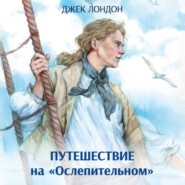По всем вопросам обращайтесь на: info@litportal.ru
(©) 2003-2024.
✖
On the Makaloa Mat/Island Tales
Настройки чтения
Размер шрифта
Высота строк
Поля
Barton glanced hurriedly, almost shamedly, at the several names and incidents, and knew surprise ere he committed the document to the flames. At any rate, Sonny had been most discreet. As he stared at the ashes, Barton pondered how much of his own younger life, from his bachelor days, resided in old MacIlwaine's keeping. Next, Barton found himself blushing, to himself, at himself. If MacIlwaine knew so much of the private lives of community figures, then had not he, her husband and protector and shielder, planted in MacIlwaine's brain a suspicion of Ida?
"Anything on your mind?" Lee asked his wife that evening, as he stood holding her wrap while she put the last touches to her dressing.
This was in line with their old and successful compact of frankness, and he wondered, while he waited her answer, why he had refrained so long from asking her.
"No," she smiled. "Nothing particular. Afterwards.. perhaps.. "
She became absorbed in gazing at herself in the mirror, while she dabbed some powder on her nose and dabbed it off again.
"You know my way, Lee," she added, after the pause. "It takes me time to gather things together in my own way – when there are things to gather; but when I do, you always get them. And often there's nothing in them after all, I find, and so you are saved the nuisance of them."
She held out her arms for him to place the wrap about her – her valiant little arms that were so wise and steel-like in battling with the breakers, and that yet were such just mere-woman's arms, round and warm and white, delicious as a woman's arms should be, with the canny muscles, masking under soft-roundness of contour and fine smooth skin, capable of being flexed at will by the will of her.
He pondered her, with a grievous hurt and yearning of appreciation-so delicate she seemed, so porcelain-fragile that a strong man could snap her in the crook of his arm.
"We must hurry!" she cried, as he lingered in the adjustment of the flimsy wrap over her flimsy-prettiness of gown. "We'll be late. And if it showers up Nuuanu, putting the curtains up will make us miss the second dance."
He made a note to observe with whom she danced that second dance, as she preceded him across the room to the door; while at the same time he pleasured his eye in what he had so often named to himself as the spirit-proud flesh-proud walk of her.
"You don't feel I'm neglecting you in my too-much poker?" he tried again, by indirection.
"Mercy, no! You know I just love you to have your card orgies. They're tonic for you. And you're so much nicer about them, so much more middle-aged. Why, it's almost years since you sat up later than one."
It did not shower up Nuuanu, and every overhead star was out in a clear trade-wind sky. In time at the Inchkeeps' for the second dance, Lee Barton observed that his wife danced it with Grandison – which, of itself, was nothing unusual, but which became immediately a registered item in Barton's mental books.
An hour later, depressed and restless, declining to make one of a bridge foursome in the library and escaping from a few young matrons, he strolled out into the generous grounds. Across the lawn, at the far edge, he came upon the hedge of night-blooming cereus. To each flower, opening after dark and fading, wilting, perishing with the dawn, this was its one night of life. The great, cream-white blooms, a foot in diameter and more, lily-like and wax-like, white beacons of attraction in the dark, penetrating and seducing the night with their perfume, were busy and beautiful with their brief glory of living.
But the way along the hedge was populous with humans, two by two, male and female, stealing out between the dances or strolling the dances out, while they talked in low soft voices and gazed upon the wonder of flower-love. From the lanai drifted the love-caressing strains of "Hanalei" sung by the singing boys. Vaguely Lee Barton remembered – perhaps it was from some Maupassant story – the abbe, obsessed by the theory that behind all things were the purposes of God and perplexed so to interpret the night, who discovered at the last that the night was ordained for love.
The unanimity of the night as betrayed by flowers and humans was a hurt to Barton. He circled back toward the house along a winding path that skirted within the edge of shadow of the monkey-pods and algaroba trees. In the obscurity, where his path curved away into the open again, he looked across a space of a few feet where, on another path in the shadow, stood a pair in each other's arms. The impassioned low tones of the man had caught his ear and drawn his eyes, and at the moment of his glance, aware of his presence, the voice ceased, and the two remained immobile, furtive, in each other's arms.
He continued his walk, sombred by the thought that in the gloom of the trees was the next progression from the openness of the sky over those who strolled the night-flower hedge. Oh, he knew the game when of old no shadow was too deep, no ruse of concealment too furtive, to veil a love moment. After all, humans were like flowers, he meditated. Under the radiance from the lighted lanai, ere entering the irritating movement of life again to which he belonged, he paused to stare, scarcely seeing, at a flaunt of display of scarlet double-hibiscus blooms. And abruptly all that he was suffering, all that he had just observed, from the night- blooming hedge and the two-by-two love-murmuring humans to the pair like thieves in each other's arms, crystallized into a parable of life enunciated by the day-blooming hibiscus upon which he gazed, now at the end of its day. Bursting into its bloom after the dawn, snow-white, warming to pink under the hours of sun, and quickening to scarlet with the dark from which its beauty and its being would never emerge, it seemed to him that it epitomized man's life and passion.
What further connotations he might have drawn he was never to know; for from behind, in the direction of the algarobas and monkey-pods, came Ida's unmistakable serene and merry laugh. He did not look, being too afraid of what he knew he would see, but retreated hastily, almost stumbling, up the steps to the lanai. Despite that he knew what he was to see, when he did turn his head and beheld his wife and Sonny, the pair he had seen thieving in the dark, he went suddenly dizzy, and paused, supporting himself with a hand against a pillar, and smiling vacuously at the grouped singing boys who were pulsing the sensuous night into richer sensuousness with their honi kaua wiki-wiki refrain.
The next moment he had wet his lips with his tongue, controlled his face and flesh, and was bantering with Mrs. Inchkeep. But he could not waste time, or he would have to encounter the pair he could hear coming up the steps behind him.
"I feel as if I had just crossed the Great Thirst," he told his hostess, "and that nothing less than a high-ball will preserve me."
She smiled permission and nodded toward the smoking lanai, where they found him talking sugar politics with the oldsters when the dance began to break up.
Quite a party of half a dozen machines were starting for Waikiki, and he found himself billeted to drive the Leslies and Burnstons home, though he did not fail to note that Ida sat in the driver's seat with Sonny in Sonny's car. Thus, she was home ahead of him and brushing her hair when he arrived. The parting of bed-going was usual, on the face of it, although he was almost rigid in his successful effort for casualness as he remembered whose lips had pressed hers last before his.
Was, then, woman the utterly unmoral creature as depicted by the German pessimists? he asked himself, as he tossed under his reading lamp, unable to sleep or read. At the end of an hour he was out of bed, and into his medicine case. Five grains of opium he took straight. An hour later, afraid of his thoughts and the prospect of a sleepless night, he took another grain. At one-hour intervals he twice repeated the grain dosage. But so slow was the action of the drug that dawn had broken ere his eyes closed.
At seven he was awake again, dry-mouthed, feeling stupid and drowsy, yet incapable of dozing off for more than several minutes at a time. He abandoned the idea of sleep, ate breakfast in bed, and devoted himself to the morning papers and the magazines. But the drug effect held, and he continued briefly to doze through his eating and reading. It was the same when he showered and dressed, and, though the drug had brought him little forgetfulness during the night, he felt grateful for the dreaming lethargy with which it possessed him through the morning.
It was when his wife arose, her serene and usual self, and came in to him, smiling and roguish, delectable in her kimono, that the whim-madness of the opium in his system seized upon him. When she had clearly and simply shown that she had nothing to tell him under their ancient compact of frankness, he began building his opium lie. Asked how he had slept, he replied:
"Miserably. Twice I was routed wide awake with cramps in my feet. I was almost too afraid to sleep again. But they didn't come back, though my feet are sorer than blazes."
"Last year you had them," she reminded him.
"Maybe it's going to become a seasonal affliction," he smiled. "They're not serious, but they're horrible to wake up to. They won't come again till to-night, if they come at all, but in the meantime I feel as if I had been bastinadoed."
In the afternoon of the same day, Lee and Ida Barton made their shallow dive from the Outrigger beach, and went on, at a steady stroke, past the diving-stage to the big water beyond the Kanaka Surf. So quiet was the sea that when, after a couple of hours, they turned and lazily started shoreward through the Kanaka Surf they had it all to themselves. The breakers were not large enough to be exciting, and the last languid surf-boarders and canoeists had gone in to shore. Suddenly, Lee turned over on his back.
"What is it?" Ida called from twenty feet away.
"My foot – cramp," he answered calmly, though the words were twisted out through clenched jaws of control.
The opium still had its dreamy way with him, and he was without excitement. He watched her swimming toward him with so steady and unperturbed a stroke that he admired her own self-control, although at the same time doubt stabbed him with the thought that it was because she cared so little for him, or, rather, so much immediately more for Grandison.
"Which foot?" she asked, as she dropped her legs down and began treading water beside him.
"The left one – ouch! Now it's both of them."
He doubled his knees, as if involuntarily raised his head and chest forward out of the water, and sank out of sight in the down-wash of a scarcely cresting breaker. Under no more than a brief several seconds, he emerged spluttering and stretched out on his back again.
Almost he grinned, although he managed to turn the grin into a pain-grimace, for his simulated cramp had become real. At least in one foot it had, and the muscles convulsed painfully.
"The right is the worst," he muttered, as she evinced her intention of laying hands on his cramp and rubbing it out. "But you'd better keep away. I've had cramps before, and I know I'm liable to grab you if these get any worse."
Instead, she laid her hands on the hard-knotted muscles, and began to rub and press and bend.
"Please," he gritted through his teeth. "You must keep away. Just let me lie out here – I'll bend the ankle and toe-joints in the opposite ways and make it pass. I've done it before and know how to work it."
She released him, remaining close beside him and easily treading water, her eyes upon his face to judge the progress of his own attempt at remedy. But Lee Barton deliberately bent joints and tensed muscles in the directions that would increase the cramp. In his bout the preceding year with the affliction, he had learned, lying in bed and reading when seized, to relax and bend the cramps away without even disturbing his reading. But now he did the thing in reverse, intensifying the cramp, and, to his startled delight, causing it to leap into his right calf. He cried out with anguish, apparently lost control of himself, attempted to sit up, and was washed under by the next wave.
He came up, spluttered, spread-eagled on the surface, and had his knotted calf gripped by the strong fingers of both Ida's small hands.
"It's all right," she said, while she worked. "No cramp like this lasts very long."
"I didn't know it could be so savage," he groaned. "If only it doesn't go higher! It makes one feel so helpless."
He gripped the biceps of both her arms in a sudden spasm, attempting to climb out upon her as a drowning man might try to climb out on an oar and sinking her down under him. In the struggle under water, before he permitted her to wrench clear, her rubber cap was torn off, and her hairpins pulled out, so that she came up gasping for air and half-blinded by her wet-clinging hair. Also, he was certain he had surprised her into taking in a quantity of water.
"Keep away!" he warned, as he spread-eagled with acted desperateness.
But her fingers were deep into the honest pain-wrack of his calf, and in her he could observe no reluctance of fear.
"It's creeping up," he grunted through tight teeth, the grunt itself a half-controlled groan.
He stiffened his whole right leg, as with another spasm, hurting his real minor cramps, but flexing the muscles of his upper leg into the seeming hardness of cramp.
The opium still worked in his brain, so that he could play-act cruelly, while at the same time he appraised and appreciated her stress of control and will that showed in her drawn face, and the terror of death in her eyes, with beyond it and behind it, in her eyes and through her eyes, the something more of the spirit of courage, and higher thought, and resolution.
Still further, she did not enunciate so cheap a surrender as, "I'll die with you." Instead, provoking his admiration, she did say, quietly: "Relax. Sink until only your lips are out. I'll support your head. There must be a limit to cramp. No man ever died of cramp on land. Then in the water no strong swimmer should die of cramp. It's bound to reach its worst and pass. We're both strong swimmers and cool-headed – "

















